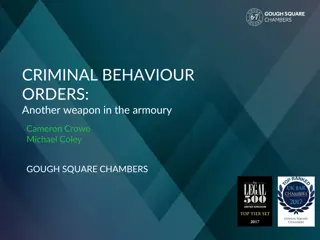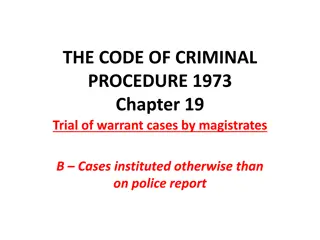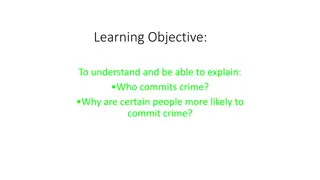Fundamentals of Criminal Law and Procedure
Explore the key aspects of criminal law and procedure, including definitions of crime, the role of criminal procedure, sources of law, phases of the criminal process, participants involved, and rules of evidence in legal proceedings. Gain insight into how criminal law is distinct from civil law and understand the significance of evidence in fact-finding processes.
Download Presentation

Please find below an Image/Link to download the presentation.
The content on the website is provided AS IS for your information and personal use only. It may not be sold, licensed, or shared on other websites without obtaining consent from the author. Download presentation by click this link. If you encounter any issues during the download, it is possible that the publisher has removed the file from their server.
E N D
Presentation Transcript
Dorota Czerwiska Criminal Procedure and Courts - Introduction
Criminal Law Criminal law is the field of law which deals with the social and legal phenomenon of crime There is no universally acclaimed definition of crime Crime is an unlawful act punishable by state, forbidden by the law, socially harmful and committed without any exaggerating circumstances or circumstances excluding guilt The focus on public interest is what differs criminal law from civil law
Criminal Procedure The law forbidding certain action would be ineffective without criminal procedure criminal procedure enables the application of criminal substantive law criminal procedural law is a body of provisions that regulates the way in which criminal law is applied, i.e. how the suspects are charged, accused and convicted or acquitted
Sources of law in the field of criminal procedure Constitution Code of Criminal Procedure/Rules of Criminal Procedure ECHR EU law
Phases of Criminal Process Enforcement proceedings (if convicted) Pre-trial (investigation) Court proceedings ( trial)
Participants of Criminal Process Suspect ? Accused Victim Police Prosecuto r Court
Other participants Parties representatives: defence counsel, victim s counsel Witnesses Expert witnesses Translators and interpreters In some countries: representatives of the society/society s interest: NGOs
Evidence Rules of evidence it is a set of legal rules that tell us how evidence can and cannot be collected and presented to the court Evidence an information or a source of information on the facts which are important to decide on the guilt Fact-finding it is a process of establishing factual circumstances regarding the crime Exclusionary rules legal rules which forbid to use certain evidence and order us to exclude from the evidence which the judgment will be based on
Coercive measures Arrest by the Police, short-term Pre-trial detention, detention on remand by the court, longer Bail buying yourself out of detention on remand ;) in USA we say to refuse bail , because you generally have the right to bail
History of Criminal Procedure three types of development of criminal process 1.accusatorial form 2.inquisitorial form 3.mixed form
Accusatorial form dominant role of accusation (the commencement of criminal process depend on the accusation of interested person) historically victim currently prosecutor (trial) and victim (pre-trial) adversariality recommends conducting trial in a form of argue between parties to the criminal process public proceedings direct presentation of evidence
Inquisitorial form originally/historically keeping all functions during the proceedings in one hand: accusing defending judging (giving verdict and sentence) limited role of the parties no adversariality no public proceedings ruling based on documents
Mixed form pretrial proceedings inquisitorial trial proceedings adversarial currently most countries have mixed or accusatorial procedure adoption of accusatorial or mixed model is not a guarantee in achieving neither TRUTH nor JUST/FAIR process
Adversarial Criminal Process Typical for common law countries A criminal process is seen as a fight (competition) between two equal parties, watched by an independent and inactive (passive) judge who does not intervene in evidence proceedings Complicated system of exclusionary rules Truth as an object of discourse A particular importance of a plea of guilty if made, it totally excludes the question of guilt and evidence proceedings ? it entitles the court to go strictly to sentencing Separate adjudication of guilt and sentencing
Other features of criminal procedure in common law countries Victim is not a party proceedings; he or she may be heard as witness and present a VIS (Victim Impact Statement) Huge importance of case law - the whole system is based on precedent Prosecutors as politicians - even elected Opportunism ( principle of mandatory prosecution) - the prosecutor has a wide discretion in deciding whether it is necessary to prosecute a case
Non-Adversarial Criminal Process Typical for continental law countries A criminal process is seen as a common effort to establish truth, with burden of proof shared by the prosecutor and the court, with active judge who has the duty to intervene (contemporary) rights of parties to shape the proceedings Truth as an objective ideal that is supposed to be pursued A different notion of the confession of guilt even if the defendant confessed, it does not exclude the question of guilt and evidence proceedings ? it is just an evidence alongside other evidence; it sometimes entitles the court to limit the presentation of other evidence Usually: joint adjudication of guilt and sentencing in evidence proceedings and
Other features of criminal procedure in continental law countries Victim is/may decide to be a party to the proceedings in some countries; in others he or she is usually entitled to take part as a civil party with rights limited to obtaining compensation case law important but not a source of law prosecutors as professional officials & state authorities mandatory or non-mandatory prosecution it depends on a particular country
Case-law in different legal cultures In continental law countries, case law is not a source of law but to some extent shapes the practice of criminal process In common law countries, case law constitutes the law as well and may be invoked as a source of rights and duties Great importance of ECtHR jurisprudence in Europe
Modern Criminal Procedure An interdependent criminal justice system all actors have their goals Multicentric law system in the EU Growing Overload of Criminal Justice System how to deal with it? Opportunism = right but not the duty to charge Abbreviated Trial and Shortened Procedures Plea bargaining and other negotiated justice instruments Penal orders
Introduction to Comparative Law Comparative Law is a branch of law which deals with comparing different legal cultures We need to compare the same objects - you compare like with like you compare institutions that have the same function you do not search only where you expect to find the answer best to choose specific points/features of an institution to be compared Ultimate aim: to improve one s own law
Introduction to Comparative Law macrocomparison - comparing different legal cultures microcomparison - comparing specific legal institutions usually very difficult to draw the line - most of the time you study both law in books law in action without studying law in action you cannot understand why a particular problem is solved in a specific way in a system
Introduction to Comparative Law you have to carefully choose to countries on ground that are scientifically justified - although no firm rules; usually some sort of representativeness is desirable apart from description of the law of chosen countries (separate objective national reports), a critical analysis and conclusion is needed - and it may not be limited to simply enlisting differences and similarities
Legal Transplants v. Legal Translations The division was first made by M. Langer Transplant = take the institution as it is and put it into another system But would it work the same way? Translation = understand the institution and try to translate it to the language of other criminal process (culture)
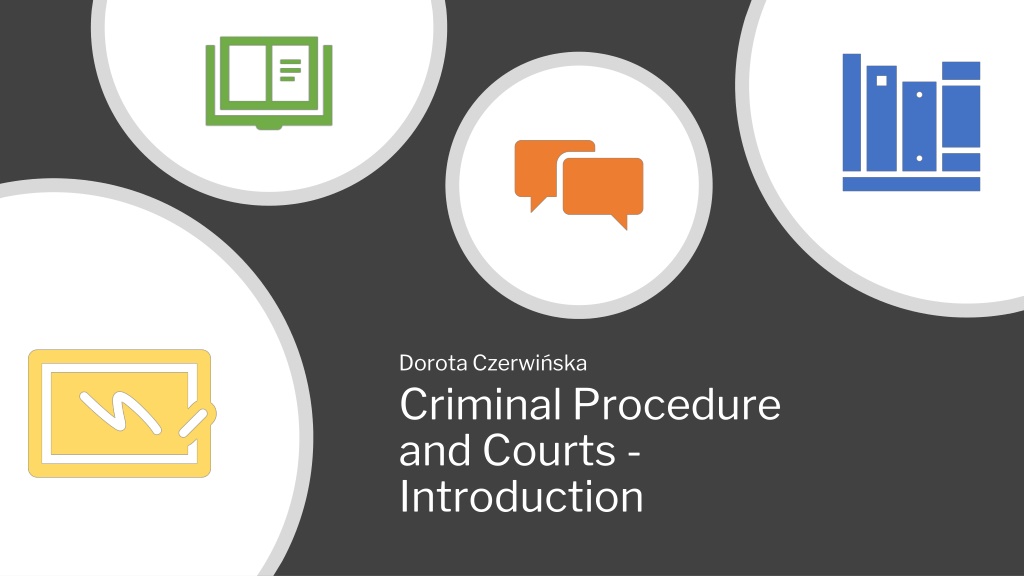


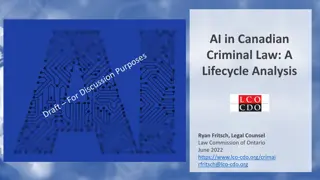


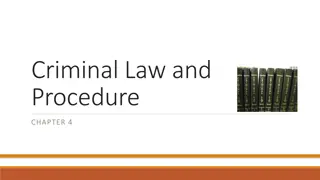
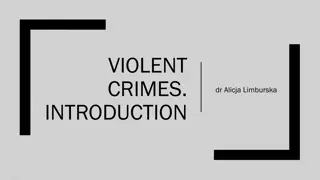
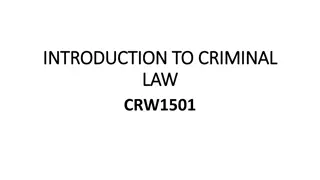
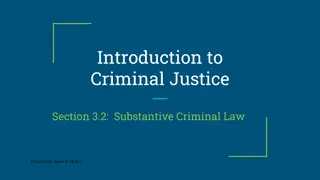
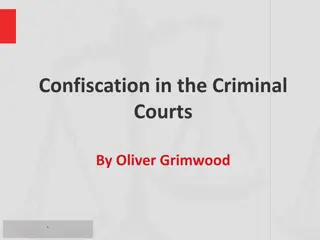


![Briefing on the Criminal Procedure Amendment Bill [B12-2021] to the Portfolio Committee on Justice and Correctional Services](/thumb/157093/briefing-on-the-criminal-procedure-amendment-bill-b12-2021-to-the-portfolio-committee-on-justice-and-correctional-services.jpg)
